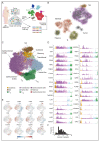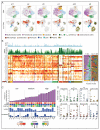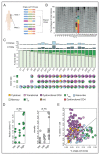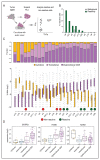Dysfunctional CD8 T Cells Form a Proliferative, Dynamically Regulated Compartment within Human Melanoma
- PMID: 30595452
- PMCID: PMC7253294
- DOI: 10.1016/j.cell.2018.11.043
Dysfunctional CD8 T Cells Form a Proliferative, Dynamically Regulated Compartment within Human Melanoma
Erratum in
-
Dysfunctional CD8 T Cells Form a Proliferative, Dynamically Regulated Compartment within Human Melanoma.Cell. 2020 Apr 30;181(3):747. doi: 10.1016/j.cell.2020.04.017. Cell. 2020. PMID: 32359441 No abstract available.
Abstract
Tumor immune cell compositions play a major role in response to immunotherapy, but the heterogeneity and dynamics of immune infiltrates in human cancer lesions remain poorly characterized. Here, we identify conserved intratumoral CD4 and CD8 T cell behaviors in scRNA-seq data from 25 melanoma patients. We discover a large population of CD8 T cells showing continuous progression from an early effector "transitional" into a dysfunctional T cell state. CD8 T cells that express a complete cytotoxic gene set are rare, and TCR sharing data suggest their independence from the transitional and dysfunctional cell states. Notably, we demonstrate that dysfunctional T cells are the major intratumoral proliferating immune cell compartment and that the intensity of the dysfunctional signature is associated with tumor reactivity. Our data demonstrate that CD8 T cells previously defined as exhausted are in fact a highly proliferating, clonal, and dynamically differentiating cell population within the human tumor microenvironment.
Keywords: T cell dysfunction; immune checkpoints; immunology; immunotherapy; melanoma; single-cell RNA-seq; tumor immunology; tumor microenvironment; tumor reactivity.
Copyright © 2018 Elsevier Inc. All rights reserved.
Conflict of interest statement
A patent application has been filed related to this work.
Figures






References
-
- Ahrends T, Spanjaard A, Pilzecker B, Babala N, Bovens A, Xiao Y, Jacobs H, Borst J. CD4+T Cell Help Confers a Cytotoxic T Cell Effector Program Including Coinhibitory Receptor Downregulation and Increased Tissue Invasiveness. Immunity. 2017;47:848–861.e5. - PubMed
-
- Bergmann S, Ihmels J, Barkai N. Iterative signature algorithm for the analysis of large-scale gene expression data. Phys Rev E. 2003;67 031902. - PubMed
Publication types
MeSH terms
Substances
Grants and funding
LinkOut - more resources
Full Text Sources
Other Literature Sources
Medical
Molecular Biology Databases
Research Materials

